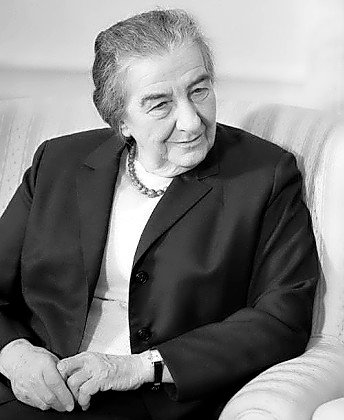Noting with pride the history of Israeli women
Editor’s note: Noa Tishby said on Sunday that the Israeli government had terminated her role as the Jewish state’s first Special Envoy for Combating Antisemitism and Delegitimization. Story on page 5.
March was Women’s History Month, an opportunity to celebrate the contribution of Israeli women to female freedom, dignity and inclusion all over the world.
In America, it is rightly acknowledged that women in frontier states and territories were often the first to win rights and social respect, with women being given the vote in 1869 in Wyoming Territory.
Similarly, the idealistic Jews who built the Zionist society in pre-state Ottoman and British Mandatory Palestine gave social status and rights to women that were ahead of virtually every contemporary society.
In 1898, ahead of the Second Zionist Congress, visionary leader Theodor Herzl decided that women would have the right to vote in institutions created by the Zionist society in the Land of Israel — the Yishuv. Debate on universal women’s suffrage began immediately with the British liberation of then-Palestine from the Ottoman Turks in 1917 and 25 women were elected to the Yishuv’s first Constituent Assembly in 1925.
My grandmother was one of the strong women who came to Israel to live at the first kibbutz — Degania Alef. This kibbutz granted women equal rights to men, including, of course, the vote, in 1911, the year after it was founded. My grandmother had made a harrowing journey to escape the Bolshevik Revolution in Russia and participate in the building of a progressive Jewish society in Israel.
In the fight for Israeli independence in 1947-1949, women in the elite Palmach often fought on the front lines. To this day, the Israel Defense Forces are renowned worldwide for the complete inclusion of women, including in the mandatory draft and even in combat roles.
In 1951, just three years after the modern State of Israel was established, the First Knesset successfully passed the Women’s Equal Rights Law, which guaranteed the equal status of men and women. Eleven women served in the First Knesset, making up 9% of its members. That year, there were only 10 women in both houses of the US Congress.
Women’s equality in Israel was based upon the new country’s Declaration of Independence, which specifies equality for everyone with no discrimination based on religion, race or gender.
One of the great icons of 20th century women’s leadership was Israeli Prime Minister Golda Meir, who spent many of her formative years in Wisconsin. From 1969-1974, she provided bold leadership in turbulent times, successfully leading Israel through the mortal threat of the treacherous surprise invasion by the Egyptian and Syrian armies on Yom Kippur in 1973.
Meir was also renowned for the wisdom and humanity of her pithy aphorisms, such as, “Peace will come when the Arabs love their children more than they hate us.”
Her service was generations ahead of the Arab countries, which did not elect a female prime minister until the groundbreaking election of Tunisia’s incumbent female Prime Minister Najla Bouden Romdhan in 2021.
It’s a privilege to be a woman in Israel today.
According to Georgetown University’s Women, Peace and Security Index, Israel ranks among the top 30 countries in the world to be a woman. Women now make up 57% of students in higher education in Israel. Women who choose to have children are supported with a monthly stipend per child, regardless of income, easing worries about how they’ll pay for their growing family.
Women have succeeded at all levels of Israeli society. Two stunning recent examples are Ada Yonath, a scientist who won the Nobel Prize in Chemistry in 2009, and Dorit Beinisch, who served as the ninth president of Israel’s Supreme Court from 2006-2012.
Israel enabled me to pursue and fulfill my own dreams. From being a child star to becoming a producer in Hollywood, an author and Israel’s Special Envoy for Combating Antisemitism, I have never known a difference between what I can achieve and what a man can achieve. Israeli women are known to be tough — and we are.
But in other Middle Eastern countries, women are living a nightmare instead of achieving their dreams.
In Saudi Arabia, a woman needs permission from a male guardian to get married. Once married, she is legally obligated to obey her husband.
In Iran, since the 1979 Islamic Revolution, women have been forced to wear head-to-toe headscarves in public. Government thugs sometimes rape those who ditch them for modern clothing in protest. Some of these women are even executed by the brutal theocratic regime.
As for Afghanistan, since its recapture by the Taliban in 2021, it is now the most repressive country in the world for women. Female Afghan politician Mursal Nabizada was recently murdered for standing up to the new ultra-religious dictatorship.
If I had been born in any of these neighboring countries, I would never have had the opportunities life in Israel brought me. Instead of being able to work in the field I wanted or simply express my opinion, I would have been married off to a man I didn’t love, whom I would have been legally compelled to obey.
Yet the media overwhelmingly highlights negative narratives about Israel and often blatantly lies about us, smearing us as an “apartheid” state in a heartbreaking comparison to the institutional racism of pre-Mandela South Africa.
Those who visit Israel will see the truth. Everyone, no matter what his or her gender, race, religion, sexual orientation or age is treated equally. Unlike other Middle Eastern countries, Israel has always been dedicated to providing its citizens — including girls and women of all backgrounds — fundamental rights and equal opportunities to succeed.
Let’s celebrate Israel’s success in advancing women’s rights while vigorously calling for the end of the oppression of women in countries like Iran, Saudi Arabia and Taliban Afghanistan.
I’m proud to be an Israeli woman.

 50.0°,
Light Rain
50.0°,
Light Rain 





